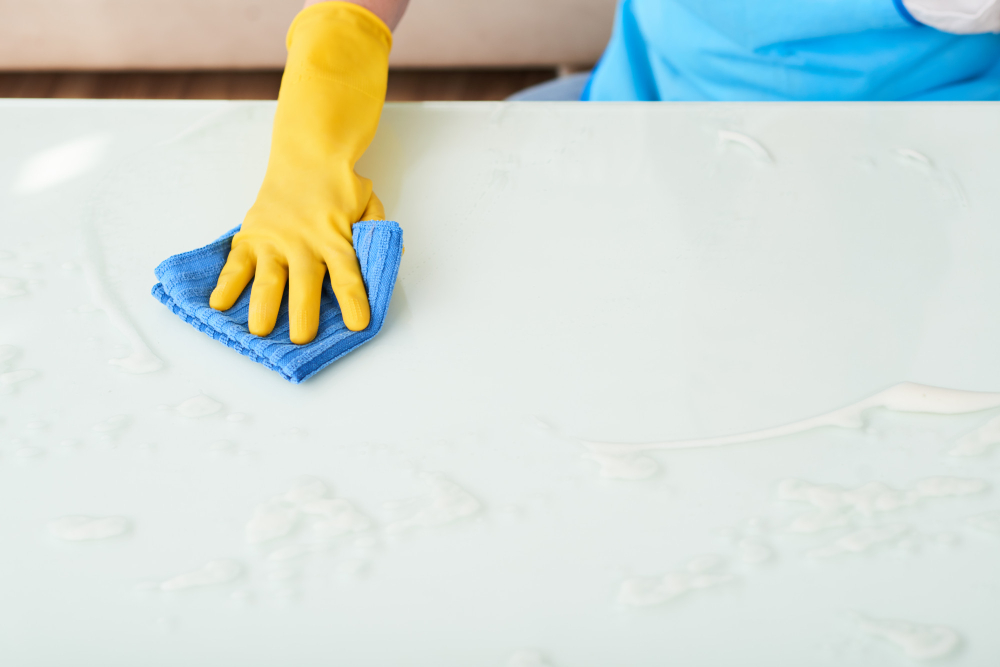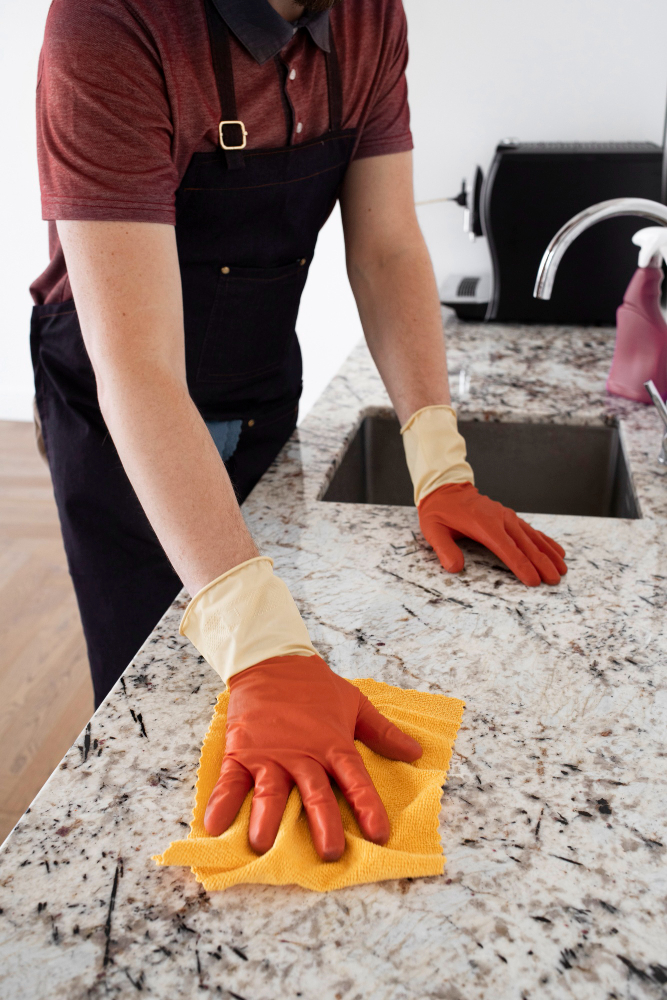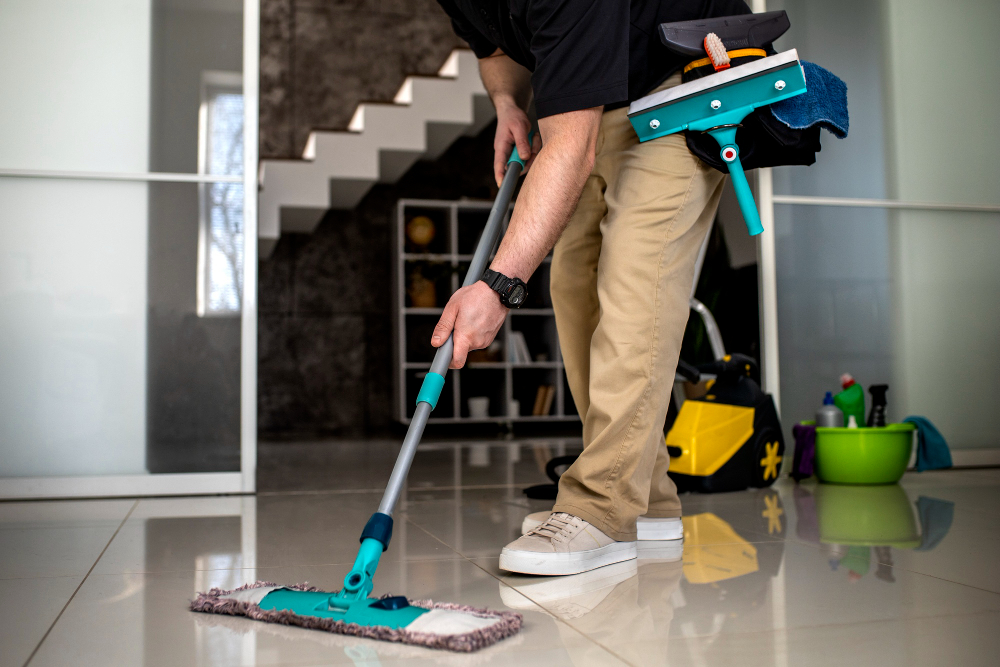
You’ve invested in gorgeous ceramic tiles or natural stone from Brisbane’s premier tile showroom. The last thing you want is to accidentally damage them with the wrong cleaning products.
Many homeowners unknowingly use harsh chemicals that can permanently stain, etch, or dull their tile surface, turning a simple cleaning session into an expensive replacement job.
Unfortunately, choosing the wrong product can cause serious harm to the tiles that may be difficult or impossible to rectify. In this blog, we’ll explore the chemicals that can damage your beautiful tiles, including what to avoid and how to properly care for them.
The Big Question: Will Bleach Damage Ceramic Tile?
Yes, bleach can damage ceramic tiles, especially the grout lines. While ceramic floor tiles themselves resist bleach better than natural stone, it breaks down grout over time and causes discoloration.
For bathroom tiles where you’re tempted to reach for bleach, there are much safer options that protect your investment.
What Are the Chemicals That Can Ruin Your Tiles?
To protect your tiles and ensure their longevity, it’s essential to understand which chemicals to avoid and adopt safer, more effective cleaning methods.
Bleach and Harsh Disinfectants
Why they’re dangerous: Destroys grout sealer, causes white spotting, breaks down adhesive bonds
Found in: Most bathroom cleaners, mold removers, toilet bowl cleaners
Better choice: Warm water with a few drops of mild detergent, or a pH neutral cleaner
Acidic Cleaners (Vinegar, Lemon-Based Products)
Why they’re dangerous: Etches marble, granite, travertine, and limestone permanently
Found in: “Natural” cleaning products, lime scale removers, some glass cleaners
Better choice: Stone-specific cleaners designed for your specific types of tile
Abrasive Scrubbers and Steel Wool
Why they’re dangerous: Scratches porcelain, leaves permanent marks on ceramic surfaces
Found in: Scouring pads, rough brushes, powder cleansers
Better choice: Soft microfiber cloths, damp cloth, or gentle brush for textured surfaces
Ammonia-Based Window Cleaners
Why they’re dangerous: Clouds ceramic finishes, damages grout and tile adhesive
Found in: Glass cleaners, some all-purpose sprays
Better choice: Clean water with a spray bottle for spot cleaning
Always keep these in mind. Our team of tile specialists and experts will always remind you the following:
- Porcelain tiles tend to be harder, more resilient and more stain-resistant than ceramic tiles. They are one of the easiest types of tile to maintain but their surface can eventually be eroded by the regular use of corrosive chemicals such as ammonia, bleach or acids that can also damage the grout and loosen the tiles.
- Natural stone tiles are particularly elegant and good looking but their beauty can be damaged by the regular use of abrasive cleaners. These include bleach and ammonia, which must never be mixed, as well as all acidic products.

What Are the Safe Cleaning Methods for Your Tile Investment?
To maintain the beauty and durability of your tiles, adopting consistent cleaning habits and knowing when to seek professional help is essential.
Here’s how to care for your tiles daily, tackle stubborn stains, and effectively preserve grout lines.
Daily Care for Floor Tiles
- Sweep or vacuum to remove dirt and dust (Brisbane’s weather brings plenty!)
- Mop with clean water and a small amount of mild detergent
- Wipe spills immediately to prevent stains
- Use clean cloth for drying – no chemicals needed
Prefer a branded pH-neutral option? Chemforce 5+5 is a pH-neutral enzyme cleaner concentrate suitable for regular mopping across natural stone, polished concrete, vinyl, and porcelain tiles. Add a few capfuls to a bucket for gentle, effective maintenance without risking etching or dulling.
Removing Stubborn Stains
- Make a paste with baking soda and water
- Let it sit for 10 minutes on the stain
- Scrub gently with a soft sponge
- Rinse thoroughly with clean water
- For soap scum in bathroom areas, try hydrogen peroxide (test in small area first)
For organic grime or mould—especially in damp or exterior areas—consider Chemforce Oxitec-M, a chlorine-free, oxygen-based cleaner formulated for natural stone, tile, concrete, and grout. Always test a small area first and follow label directions.
Caring for Grout Lines
- Use a dedicated grout cleaner (never bleach!)
- Apply fresh grout sealer annually to prevent build up
- For grout haze on new tiles, use a specialized haze remover
- Focus extra attention on high traffic areas
To protect porous stone and grout, ask us about Chemforce impregnating sealers like Stain Protector or Enhance+ (colour-enhancing for dense stone). These repel water and oils without leaving a surface film.
Special Care for Natural Stone
Marble, granite, and other natural stone need different treatment:
- Only use products labeled “safe for natural stone”
- Test any new cleaning solutions in an inconspicuous area
- Regular maintenance with appropriate materials prevents most problems
- Never use acidic products – they cause permanent damage
How to Keep Your Tiles Clean Without the Damage
| Weekly Routine | Monthly Deep Clean |
| Mop all ceramic tiles and floor tiles with appropriate detergent | Use proper cleaning methods for your specific ceramic, porcelain, or natural stone |
| Pay extra attention to bathroom and kitchen surfaces where grease and moisture create build up | Scrub grout and tiles connections gently |
| Rinse after using any cleaning solutions | Apply sealer to grout as needed |
| Wipe down with clean water to remove residue | Maintain tiles looking their best with regular use of appropriate products |
To care for the tiles properly, Stone & Tile Studio team recommends you always avoid:
- Harsh chemicals, such as bleach and acid, including lemon and vinegar, for routine cleaning; these can cause damage to the tiles and grout if used regularly and are also health hazards as well as posing danger to other property near the tiles
- Coloured cleaners that may be absorbed by the tiles, especially if unglazed, and may alter their colour
- Wax-based cleaners that may cause the tiles to become slippery and, if a build-up is allowed to occur, will result in yellow stains that are unsightly and can absorb dirt
- Abrasive materials such as steel wool and scouring powder or pads that can scratch the tiles and ruin their finish.
When Your Tiles Need Professional Help
Some situations require expert advice:
- Tile adhesive residue that won’t come off
- Deep stains that resist gentle cleaning methods
- Natural stone that’s lost its original finish
- Grout that’s permanently discolored despite proper care
People also ask the Stone and Tile team about cleaning recommendations

People also ask the Stone and Tile team about cleaning recommendations
Below are some frequently asked questions to help you better understand how to care for your ceramic tiles and avoid damage from bleach and other harsh chemicals.
1. What is the best way to prolong the life of my tiles?
The best way to prolong the life of your tiles is to look after them properly and treat them gently, despite their durability and practicality. Protect floor tiles with non-slip mats and rugs, and sweep them frequently to avoid a build-up of dirt and grit that can damage the surface. Mats at entrances will particularly help to avoid grit being walked onto the tiles.
2. How often should I clean my tiled surfaces, and what should I use?
Clean tiled surfaces regularly with a mop and warm water only, possibly daily since it only takes a few minutes. Every two weeks or so, add a mild detergent, one that is pH neutral, to the warm water. Any detergent used should be low concentration and all cleaning solutions should be rinsed off with clean, warm water before they are dry to avoid smears.
3. What is the recommended routine for cleaning bathroom and shower tiles?
For bathrooms and shower areas, remove excess water with a squeegee after every use. This will help to prevent the build-up of soap scum.
4. How do I remove stubborn stains or soap scum from my tiles?
If you do get a build-up of soap scum or any stubborn stains that can’t be removed by normal cleaning, you may need to use a solution of ammonia to remedy the problem. In these cases, add about half a cup of ammonia to a gallon of water and apply to the area of the stain only. Once the stain is gone, rinse off the chemical solution.
5. Can using chemicals damage my tiles?
Over-aggressive and prolonged use of chemicals can change the colour of your tiles, make them dull and reduce their overall beauty. You may also damage the grout and cement, so the tiles become loose.
Get Expert Advice for Your Specific Tiles
Not sure what’s safe for your ceramic, porcelain, marble, or other tiles? Different materials need different care approaches. What works perfectly for ceramic floor tiles might damage natural stone.
At Stone & Tile Studio, we’ve been Brisbane’s leading tile and stone specialists for over 25 years. We know exactly which cleaning solutions work best for different types of tile and materials – from Italian marble to locally-sourced granite.
Visit our Zillmere showroom for expert guidance on caring for your specific tiles. We can recommend the right cleaner, sealer, and cleaning methods to keep your investment looking perfect.
Book your free design consultation because your beautiful tiles deserve the right care, and we have the expertise to help you protect them properly.

